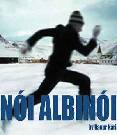|
|
||||
|
|
by Donald Levit  After the silence of the silents, repartee and witty one-liners were a hallmark of cinema. That seems centuries ago now, as many films wallow with insipid dialogue and just don't know when to stop. Of late, however, a few have shown a sense of less is more and actually made an advantage of the very sparsity of the spoken word. Some are foreign -- Divine Intervention, Osama -- some homegrown -- The Slaughter Rule, Northfork -- but all in common reflect the non-tech nature of their characters and themes. Nordic emotions held typically in deep check, with flurries of dry black irony but less color and open comedy that its country's praised 101 Reykjavik, twenty-nine-year-old director/writer Dagur Kári's feature début is Nói/Nói Albinói. In remote Icelandic Bolungarvík of 957 inhabitants, camera visibility is smeared by wind-blown or falling powdery snow, and in the one repeated long shot, the West Fjord hamlet shirts a low, narrow ledge between a cold one-ship harbor and stark blackrock outcropping mottled with winter white. In this dim unworldly place where thermometers have topped 68°F six times in a century, houses and bars are dark, too, and days are passed with video games, TV movies and exercise programs, jigsaw puzzles, cooking, karaoke and alcohol. People communicate via telephone and sometimes walkie-talkie, even when the other person is visible from their window. As Nói, first-time film actor Tómas Lemarquis heads a fitting cast of unknowns, family, and townies who briefly interact with his village misfit. Supposedly an albino, he appears rather a gangly, head-shaven teen who is an isolated oddball even among insular oddballs. He refuses to get up early, falls asleep on the high-school desk or sends a tape recorder to represent him in class, and fixes the fruit machine only to win money for a bottle of malt; he briefly works as a gravedigger who softens frozen turf with boiled water, stages an absurd bank robbery attempt, hot-wires a car but has nowhere to go, and often retreats to a cellar hidden beneath his grandmother's (Anna Fridriksdóttir, the director's neighborhood mail carrier) house. And he falls in something resembling young love, with Iris (Elín Hansdóttir, discovered in a vegetarian restaurant). Daughter of an improbable bookshop owner who disgustedly quotes Kierkegaard while trashing a book in preference to giving it away, she works at the one-pump gas station and café and has been brought back here to cleanse her of "crazy city" ideas. Alternately visiting, cooking, fighting and drinking with his manic, dipsomaniacal, sex- and Elvis-obsessed, improbable taxi-driver father Kiddi (Thröstur Leó Gunnarsson), getting expelled from school and retreating to his hidden cellar, Nói breaks into a museum with Iris and tries to convince the girl to run away with him. He has absolutely no plan, but the fortuitous destination -- Hawaii -- lights up on a map at the push of a random button. There seems some guiding force involved, as well, or maybe pure coincidence, for icing on his birthday cake bears a tropical theme, and the stereopticon viewer from Grandma has only two slides, one of a Polynesian with a belly and the other a beach with palms. Lisa insists he be allowed to spend the night on their couch after Daddy catches him foolishly on their steeply sloping roof, and it is she who shatters a glass door with a rock so they can get in. But she is only young, and at heart traditional. Much as her eyes yearn, she cannot accompany him. This is, remember, a geologically active land of ice and fire -- in fun, the press kit furnishes the local phrase for "when is the next volcano eruption?" Not the latter, but a natural snow catastrophe, brings about resolution and -- depending on whether one sees the ending Pacific slides become real as a dream or actuality -- the hero's future. Ambiguously punishment or reward, comic, absurd or ordained, this conclusion promises a possible new beginning from the rubble. Open-ended, against the self-contained but dissatisfied Nói and the impassively hostile nature of his island home, to earthy folkish music composed and played by director Kári and his band Slowblow, this official Academy Award candidate from Iceland has been selected for over thirty international festivals and already won twelve prizes. (Released by Artificial Eye/Icelandic Film Fund; not rated by MPAA.) |
||
|
© 2025 - ReelTalk Movie Reviews Website designed by Dot Pitch Studios, LLC |



